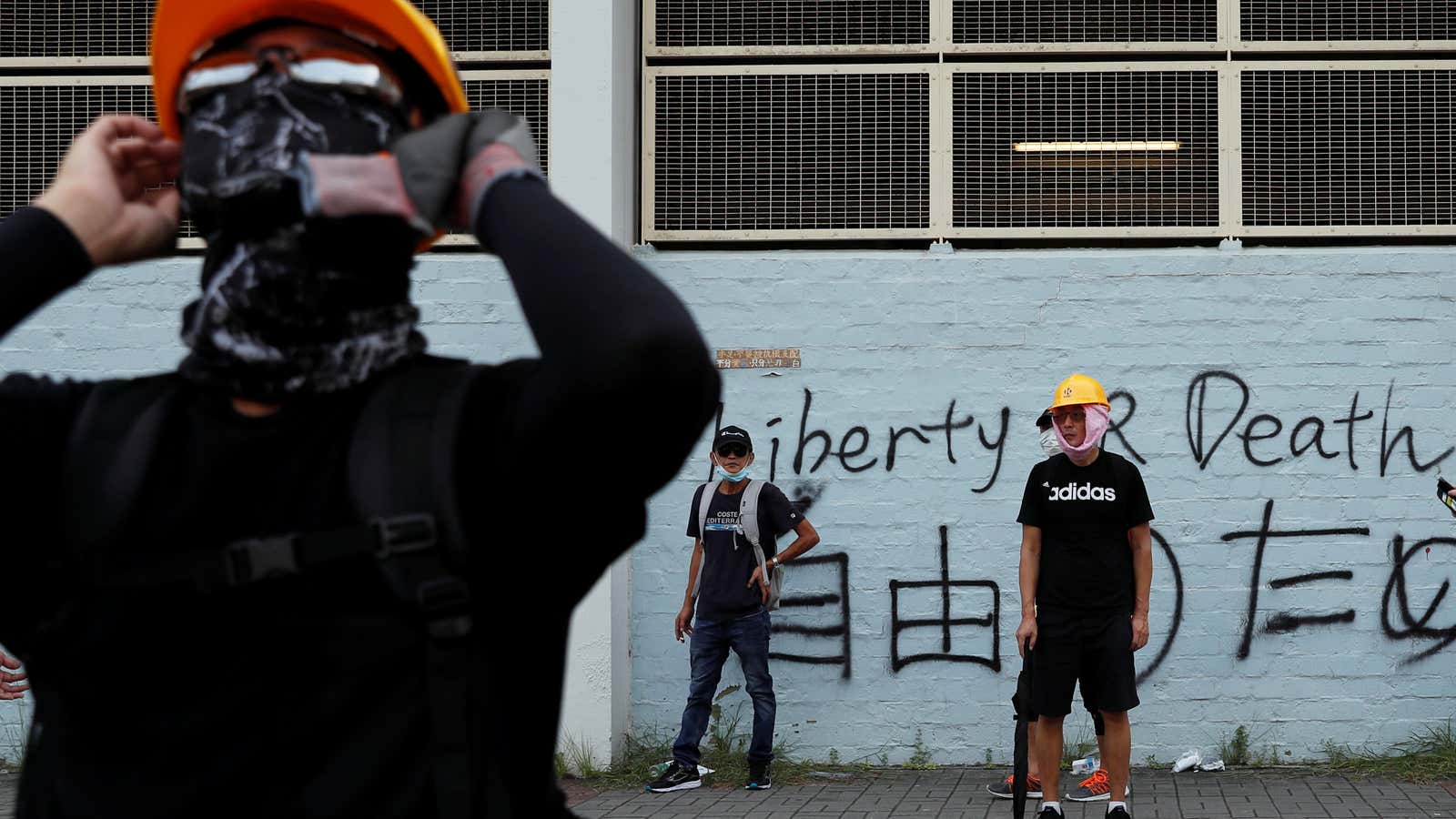The chants are thundering, rhythmic, and unifying. They ring out at protests and at press conferences. And more recently, people have also taken to belting out the protest slogans from their homes at 10 pm every night in a resounding show of unity. Just as the past 13 weeks of protests have altered the physical makeup of Hong Kong—fences dismantled, barricades erected, riot police barrelling down residential streets—so too they have changed the sounds of the city.
These are some of the key protest slogans of the ongoing movement, which started in June in opposition to an extradition bill.
Restore Hong Kong, revolution of our times (光復香港 時代革命)
The clarion call of the current wave of ongoing protests—also often translated as “liberate” or “reclaim”—this slogan traces its roots back to the election campaign of activist Edward Leung, currently serving a six-year prison sentence for rioting and assaulting a police officer during the so-called Fishball Revolution of 2016. Though not physically present at the demonstrations, Leung has become a kind of spiritual leader for protesters, offering guidance and inspiration from behind bars.
The slogan has particularly irked the Hong Kong and Chinese governments. Addressing the press earlier this month, a spokesman for the Hong Kong and Macau Affairs asked, “What exactly do you want to reclaim? Where do you want to restore Hong Kong to?” The word “revolution” surely rankles Beijing, too, as they’ve warned that Hong Kong’s protests are showing characteristics of a “color revolution“—a reference to uprisings in former Soviet countries that China believes were orchestrated, or at least inspired, by foreign players including the United States.
Hong Kong chief executive Carrie Lam has similarly condemned the slogan, repeating it verbatim at a press conference earlier this month and characterizing it as a brazen challenge to China’s sovereignty and the “one country, two systems” framework under which Hong Kong is governed. Protesters were quick to seize on this soundbite, splicing video of a grim-faced Lam uttering the slogan with an animated Leung shouting it during his 2016 election campaign. Audio of Lam repeating the slogan was also played on loop at a protest last weekend.
Hong Kongers, add oil (香港人, 加油)
“Add oil” is such a widely used phrase even among non-Cantonese speakers that it was added to the Oxford English Dictionary last year. It roughly translates as “keep it up” or “keep going,” and is used to express support and encouragement in all sorts of scenarios. Though not overtly political, it has nevertheless become one of the most popular slogans of the protest movement, and a crowd-wide call-and-answer invariably kicks off whenever someone shouts “Hong Konger.”
Perhaps because the slogan centers around Hong Kongers’ identity as one that is distinct from that of their mainland Chinese counterparts, it has become a yardstick by which to measure someone’s support of the protest movement. In July, a pilot for Cathay Pacific, the beleaguered flagship carrier of Hong Kong, used his pre-landing announcement to tell passengers about an ongoing demonstration at the Hong Kong airport’s arrival hall, and signed off with “Hong Kongers, add oil.” The recording went viral, but several weeks later it was confirmed that he was “no longer an employee” of the company, though it was unclear whether he had resigned or was fired.
Five demands, not one less (五大訴求 缺一不可)
The protesters have five core demands, and they want the government to address every single one. The demands are: the complete withdrawal of the extradition bill; establishment of an independent commission of inquiry into police conduct; retraction of the designation of “riot” to describe the protests; amnesty for arrested protesters, and full democracy.
The government has made no indication that it intends to make any concessions, however, and chief executive Lam has outright rejected the five demands. Reuters reported last week that Lam had actually suggested to the Chinese central government that withdrawing the extradition bill would help defuse the political crisis, but Beijing unilaterally shot down the proposal, ordering her to stand firm on the legislation and not to launch an inquiry into police conduct.
There are no rioters, only a tyrannical regime (沒有暴徒 只有暴政)
The protest on June 12, which saw the first rounds of tear gas and rubber bullets fired by police in the movement, was officially designated a riot by the government. Protesters object to the description, noting that the demonstration was largely peaceful and that the police had used an excessive amount of force. The charge of rioting carries a heavy sentence, and critics have said that its legal definition, which stems from a colonial-era law, is vague and open to abuse. Since June, both protesters and police have increased their use of force, and the government has repeatedly described protesters as rioters. Protesters also note that in the face of government inaction even after millions marched peacefully, they have no choice but to escalate their actions. Another slogan that has become a regular fixture of protest graffiti sums up the sentiment: “It was you who taught me that peaceful marches are useless.”
Hong Kong police know the law but break it (香港警察 知法犯法)
One of the greatest sources of public rage has been what many see as the blatant disregard of the law by those who are tasked with enforcing it: the Hong Kong police. There is widespread condemnation against alleged police brutality and collusion with criminal triads, and events in recent days—including the indiscriminate beating of citizens inside subway stations across the city this past weekend (Aug. 31)—have only further undermined public trust in the force. Protesters have also taken to calling the police “dirty cops.”
